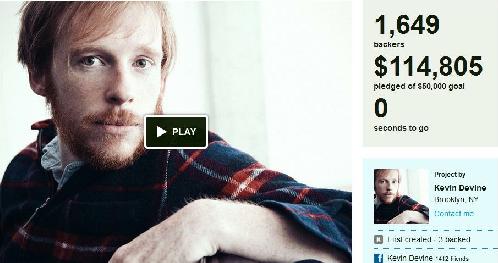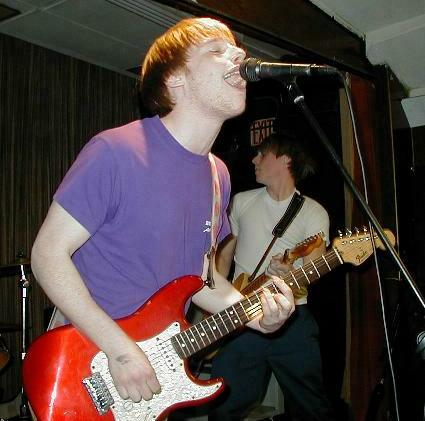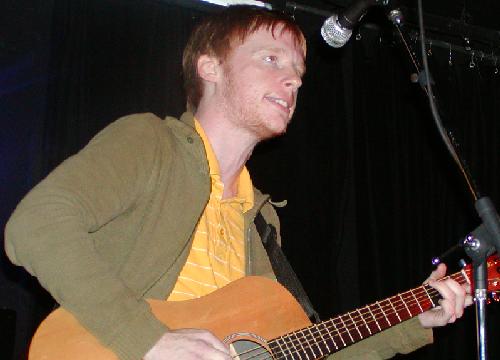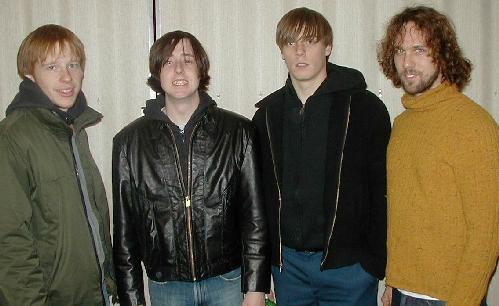|


By Jim Testa
In the 15 years or so that Kevin Devine has been kicking
around in bands, he's seen it all - small indies, middle-sized
labels, and even a short stint on a major. He didn't make
the decision to fund his next release with Kickstarter lightly,
but once he made the decision, he found that his fans were
more than willing to help: Devine reached his original goal
of $50,000 in less than one day and wound up with nearly
$115,000 in contributions. So he's been busy recording two
new collections - a solo set produced by Rob Schnapf, and
an album featuring his full ensemble The Goddamn Band with
Jesse Lacey at the helm.
But even as he's moving to shore up his future, Kevin is
also taking time to look back: He'll be performing with
his first band, The Miracle of '86. for two shows: June
14 at Maxwell's and June 15 at the Mercury Lounge.
The Miracle Of ’86 (referring to the Mets World Series
victory of that year) was formed on Staten Island in the
late Nineties by high school pals Devine and Chris McAllen.
Guitarist Mike Robertson joined the group in 1999 and drummer
Mike Skinner solidified the lineup in 2001; the band went
on to some local success and limited touring, including
the release of 2003’s well-received album “Every
Famous Last Word.” But the group disbanded a year
later, with Devine pursuing a solo career and McAllen moving
over to the Lilies. Skinner and Robertson both found success
working behind the scenes as producers, engineers, and professional
songwriters.
On a personal note, I met Kevin in 2002 at a Miracle of
’86 show in Brooklyn, and we’ve been friends
ever since. One thing you have to understand about Kevin
Devine: We know he can write, and sing, and play guitar.
But the man can also talk. Ask him a question, and he’ll
ramble on for an hour if you don’t interrupt him.
We talked by phone from L.A., where Kevin was busy recording
the first of his two Kickstarter-funded albums, and talked
about the decision to crowd-source his music and how Miracle
of '86 wound up reuniting.

Q: Let’s talk about your Kickstarter. You
started off with a goal of raising $50,000 to record two
albums, and ended up with almost $115,000 in donations.
Tell me about that process.
It was a six month process to make the decision to do it.
And over the course of the six months, I flip flopped back
and forth a hundred times. Yes, I’ll definitely do
it, no I definitely won’t do it, everything in between,
and finally, it was probably a 51/49 decision to go with
it. Detailing the entire inner working of that self-abusive
anti-intellectual process would require a 12-hour interview
all by itself. So let’s just say that it was going
to happen, then it wasn’t, then it did.
I genuinely thought that 50 grand, for two records…
to anybody, that’s a lot of money. And I thought,
we’re either going to fall flat on our faces, or we
put it up for 45 days and maybe we just squeak through and
raise the money. And then, for whatever reason, it raised
like 64 grand in the first day, and it hit the goal in nine
hours. It’s almost impossible to talk about stuff
like that, because it’s money, it’s numbers,
it’s nothing I’m used to talking about. So I’m
trying to get better at just talking directly about it.
But to me, that was genuinely shocking. In an amazing way,
in a beautiful way, obviously… But I didn’t
think, let’s ask for 50 so we blow through it in nine
hours and look really cool, I honest thought we might not
make 50,000 if we took the entire 45 days.
To break it down to a record industry perspective, I spoke
to labels about making these records. And I wouldn’t
have been able to go to any record label on the planet and
say, I want to make these two albums, and I want to be able
to promote them, and I want you to give me 115 grand to
do that. They would have just smiled and said, ‘best
of luck with that.’ So I feel like I’m lucky,
I’m grateful, and I’m acutely aware that this
is more about the audience than about myself. They spoke
very clearly, and it eradicates a lot of fearful anxiety
I had about where I was with my career. You think you’re
connecting with people, but you’re never really totally
sure. But this, it’s more than the money, it’s
the audience telling me that they value what I do. It was
overwhelming in that sense. It was my audience saying ‘we
don’t have how your music comes out, or with whom,
or through which channels. We just like that you make it,
and we want you to keep making it.
As you know, I’ve been on a major record label, I’ve
been on a bunch of small independent labels, I’ve
been on Razor & Tie, which is something in-between.
This is the most gratifying experience to this point in
my career because I’m living in Los Angeles for a
month making a record with one of my favorite producers,
not because some company is paying for me to do it, but
because the people who like my music are paying me to do
it. Any misgivings I had about the Kickstarter process vanish
when I look at it through that lens. And I’m also
grateful because I’m at the point in my career where
I like working a lot. I’ve always liked working a
lot, but in the past I was good at misdirecting myself and
clouding that work ethic with a lot of horseshit. Now that
I know I can be totally just working on music all the time,
that’s totally fine with me. So I’m also not
concerned that we’re not going to follow through on
the good faith that people have share with me. I’ve
been writing these records since the end of last year, so
it’s not like I have to come up with filler to make
the albums…
You think you know what the records are going to sound like,
and then you get into the studio and you don’t. My
idea is that the solo record with Rob Schnapf producing
would be – not in terms of the content, but just the
sound – sort of like Nebraska or Automatic For The
People. And if there were rock songs on the album, they’d
be every lean. But then we got into the studio, and it’s
definitely not turned out like that. Like, songs that I
thought would be great with just an acoustic guitar and
a shaker have turned into Pink Floyd songs or something.
But I like the idea of following the songs as you go along.
And I also thought, if I’m making a rock record with
the band, I can’t make any rock stuff with myself.
And then I realized that’s nuts, and I just followed
my instincts, and the stuff we’re doing with Rob just
sounds different. Which makes sense. These two guys from
an L.A. band called Everest played drums and bass, and they
really opened it up. Sometimes it reminds me of the Zombies
and sometimes like Neil Young’s Zuma. It’s definitely
not what I thought it was going to be.

Kevin with The Miracle of '86 in 2002.
Q: When you sit down and write a song, is it immediately
apparent whether it’s a Kevin Devine song or a Goddamn
Band song?
With this project, it became that way for sure. When we
started to think about doing the Kickstarter, we thought,
well, what can we do to make this special? Well, let’s
make two records, and let’s make them in totally different
ways. The songs on the band record we’re doing with
Jesse Lacey were written in December, January, and February.
The stuff on the Rob record, some of it I wrote a year ago,
and the last song we did for the record I wrote when I got
to L.A. in March. Those songs spanned a longer time frame.
But once we had a picture of what we were going to do with
the Kickstarter, we made a plan that we wanted to get into
the studio as soon as the Kickstarter was done. So the month
of January, I’d get up, make some coffee, sit down,
and start writing and working on music. And maybe it sounds
like punching the clock, but it was a great process. That
first song is the one that feels like you’re trying
to pull a tooth out of your head, but once that’s
over, stuff comes. I think the turning point was, there’s
a song on the Jesse record called ‘Talking Shit About
A Fiscal Cliff,’ and I started writing it and it was
like a Minutemen song or something. And I thought, I can’t
write that song, that doesn’t sound like me, that’s
stupid. And I sent it to the band, and got to rehearsal,
and Jesse said, ‘That song you sent’s amazing,
it’s great, let’s play that.’ And I was
like, I don’t even know if that’s a song. It
either sounds like Pearl Jam or the Minutemen, and I don’t
know if it’s good either way, and Jesse insisted,
no, it was good, we had to do it.
And that song became this real fun, screamy, catchy, punk
rock thing. Power chords, adrenalized. It wasn’t even
really what Miracle of 86 sounded like. To me, Miracle was
a hybrid of a lot of things we liked at the time, whether
it was Nirvana or the Pixies or the Replacements, but also
there was a wave of emo that influenced that band, things
like Texas Is The Reason and Promise Ring, and Miracle was
in the center of all that. This song is something that sounded
even a little more like punk rock than Miracle ever did.
So when that song made sense of all of a sudden, not only
did it fit, but I started writing more songs like that.
I like that kind of music a lot but I’d always talked
myself out of writing it for some reason, like I didn’t
think the chord progressions were sophisticated enough,
or another band had co-opted a certain style of song, so
I didn’t want to play it myself.
And then all these songs started to come together, some
political, some not political, some just about lack of love
or whatever… Some kind of funny, some about social
issues. But they all just poured out in a way that felt
bracing and immediate. And for the lack of a more elegant
way to say it, if I wrote something that was two and a half
minutes long and had power chords, then that was a band
song. And then when I was writing stuff that sounded like,
say, Automatic For The People – it seems
like there’s a point every year when I go back to
that record and can’t stop listening to it –
then I knew that would be for the Jesse album. I can’t
wait for people to hear these records. I think both of them
are really good in really different ways, really different
from each other and also really different from my prior
stuff, yet still sounding like the same dude wrote all the
songs. And that’s all you’re trying to do.
Q: When you do a Kickstarter, you’re basically
pre-selling the album to people at lower levels, but then
offering incentives and premiums for the donations at higher
levels. Are you looking at all the stuff you’ve promised
to do and wondering how you get yourself into this?
I think I don’t know yet. So far, I’m in the
place where I’m making the music, and that’s
always the part that’s the most exciting. I’m
in the studio 70 hours a week right now and that’s
where my head is at. But here’s what the plan was.
Again, if you don’t expect you’re going to raise
more than $50,000, then you don’t expect you’ll
have to do more than a certain amount of these bonus things.
Making $115,000 is a blessing but it also means that I have
to do two or three times more of everything we had originally
planned. So the idea was that I would work through the Spring,
record the two records, then in May I’m going to Europe
to do some club shows. And there are intermittent shows
with Bad Books through this period that were already booked.
But then from June 2 until fall, basically Kickstarter Inc.
will be my day job and I’ll spend that time at home
in the summer doing all those bonus things. So if you ordered
the package where I record a cover song for you, I’ll
do that on Monday. Then if you ordered the package where
I record one of my own songs and write down a handwritten
lyric sheet and get it framed, I’ll do that on Tuesday.
That’s what I’ll be doing this summer. So I
feel like it should be manageable. I basically run a small
business with my career at this point anyway, so there’s
always administrative stuff that has to be done. Or I’m
songwriting, or something else. It’s not like I’m
sitting on my ass watching television all day when I’m
not on tour. So I don’t think it will be overwhelming,
but I’ll find out. Some of those bigger ticket items,
like the house shows and whatnot, I said, ‘you can
put that stuff up because no one’s gonna take them,
so do whatever you want.’ And then they went in a
day.

Kevin in mid-solo career, 2009
But I do have people helping me with this. My manager and
his partner are going to be handling the records in their
garage in L.A. and we’ll have interns packing and
boxing stuff up. So I’ll probably go out there at
some point and sign a thousand things. But it all seems
doable. So right now, sunshine and roses. If you ask me
in August, I might tell you, wow, this is insane and I don’t
even know if it’s worth $115,000 to do all this stuff.
To be honest, I spent a lot more time and effort coming
up with the $200 level items because that’s what I
thought my audience could afford. But some of the higher
ticket items… For me to play at someone’s house,
I thought, I’ve played a lot of house shows in my
time but nobody’s every paid me $4,000 to play one,
so that is never going to happen, so put up whatever you
want. And I was obviously wrong. So I don’t know who
that is yet, but that I think could be the most interesting
experience out of all this. I’m speechless that people
would do that shit, it’s all just amazing.

The Miracle of '86 in 2002.
Q: I’m really glad I’m going to get
to see Miracle of ’86 again. Was this reunion something
that has been festering for a while?
I really never thought our band would play together again,
it wasn’t even a flickering thought in my head as
recently as a year ago. That band broke up nine years ago
and we’ve all gone on to other things. In 2010, the
Goddamn Band and I put together a show at Maxwell’s
to celebrate the re-release of Split The Country/Split The
Streets. The rehearsals for that were so much fun, and it
occurred to me that Mike (Robertson) had played guitar on
that record. We hadn’t talked at that point in four
or five years, but I emailed him and asked him if he wanted
to come up and play with us. His response was very warm
and he explained that he couldn’t get out of work
to do the shows, but the tone made me think that he was
very receptive. I was pretty messy in my early to mid-twenties,
and I made some poor decisions and did some things I’m
not proud of, and I wasn’t happy with the way we had
left things. So I just suggested we get together and we
had lunch, and it was really nice. We talked for over two
hours, and a door was opened.
Q: Was there any hesitation about getting back together?
I seem to recall that there were some pretty strong ill
feelings when the band broke up.
The band was really fun but bands do break up, and by the
end everyone wanted to kill each other, so there were some
thoughts about if we really wanted to go back there. But
in the end, we all thought it would be good idea.
Then Sandy happened, and one of my best friends in the
world, Chris O’Brien, lost his house on Staten Island.
Everything destroyed, wiped out. McAllen and I had grown
up with Chris, he was always the kid in the Staten Island
hardcore scene, he never played in bands himself but he
was a fixture at every show we were at. When stuff like
that happens, you talk to ex-girlfriends you haven’t
talked to in ten years because you want to make sure they
got through the storm all right. It brings a lot of people
together. So I wrote to McAllen, since his parents still
live on Staten Island, and made sure they were all okay.
And I thought, if this band was ever going to play again,
this would be the perfect reason. And also there’s
a club on Staten Island called The Full Cup, and the owner’s
been after me to do a show there forever. So what if we
did a Miracle show at this guy’s club on Staten Island?
It was the best of all worlds. So we gave some of the money
to Staten Island Strong and some to Chris directly, we raised
over two grand for Chris’ family and $1,500 for Staten
Island Strong, and for a small club on Staten Island, that’s
pretty good. McAllen said he was in, Skinner and Robertson
were like “let’s go,” we put 150 tickets
up on sale, and they were gone in a day. So I thought, that’s
cool, people actually remember this and people want to see
it. And it was really fun.
It was simultaneously like feeling the passage of time and
remembering that we had spent a lot of time together, in
this context. And once we got past that initial awkwardness,
which was a little weird at first, it was just great. A
lot of fun, a lot of stories, a lot of ball-busting. Played
the songs and they sounded really good. It was a treat.
So after the show, we were thinking, well, there’s
some interest here. We heard from a lot of people who couldn’t
get tickets because they sold out so quickly, or couldn’t
get to Staten Island. It wasn’t like when the Pixies
got back together, we didn’t mistake it for anything
that big. I think Miracle’s biggest record sold 2,000
copies, and our longest, broadest tour got as far west as
Omaha and as far south as Birmingham. So we can’t
go and do a tour and have it be worth anybody’s time,
but the idea of doing a weekend seemed very feasible. Well,
we don’t hate each other, we don’t want to kill
each other anymore, we really enjoyed playing together.
We still like the songs. What if we did a New York show
or a New Jersey show? So the guy who books my show came
to that reunion show and really liked it. ‘I saw your
band ten years ago and didn’t think much of it,’
he said. And that’s fair. There were a lot of great
Miracle shows and some really shitty Miracle shows. So he
put the feelers out and it worked out perfectly. Mercury
Lounge and Maxwell’s are two places where we played
a ton. And in lieu of Brownie’s, which isn’t
around anymore, I think Mercury Lounge is probably the only
surviving New York club where we’d feel at home. In
fact, the first Miracle show before Robertson had even joined
the band, prior to my 18th birthday, was at Mercury Lounge.
There’s a lot of history there for the band, and the
same for Maxwell’s. Miracle probably played at Maxwell’s
three or four times. And I’m hoping both shows will
sell out. Back when Miracle of ’86 was playing those
clubs the first times, we weren’t selling out anywhere,
so it will be nice to have played there, gone on and done
other things for nine years, and then come back to those
places and have them actually be full.
JerseyBeat.com
is an independently published music fanzine
covering punk, alternative, ska, techno and garage
music, focusing on New Jersey and the Tri-State
area. For the past 25 years, the Jersey Beat music
fanzine has been the authority on the latest upcoming
bands and a resource for all those interested in
rock and roll.
|
|
|

